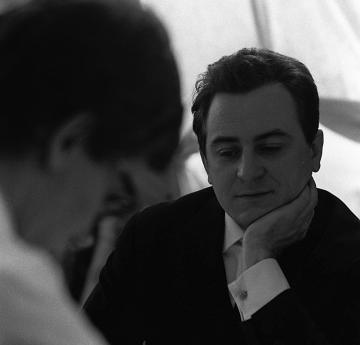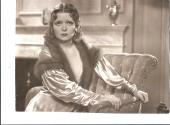'L'Amour Fou' explores the exquisite, beautiful and tragic life of Yves Saint Laurent
In the realm of interplanetary time travel, the planet known as France during the 1950s-1970s seems longer ago and further away than Luke Skywalker's galaxy in "Star Wars."
"L'Amour Fou" (Crazy Love) lovingly chronicles the reign of its cultural emperor, Yves Saint Laurent. In the course of it, director Pierre Thoretton fashions both a bio-documentary and a dark Meditation on the Miserably Rich and Famous.
The tale of YSL and his era is told through the eyes and running commentary of his lifelong partner Peter Berge, the wealthy industrialist he met, appropriately enough, at the 1957 funeral of Christian Dior, when pathologically shy Saint Laurent -- Dior's protege -- was just 21.
Thematically, the film is concerned with Saint Laurent's fabulous fashion designs. Dramatically, it focuses on his fabulous art collection -- and Mr. Berge's stunning decision to liquidate and auction it off upon YSL's death in 2008.
Newsreel footage at the outset shows the designer -- looking tired and wasted -- making his professional farewell and announcement of retirement due to general exhaustion, "the prison of depression," and alcohol and drug dependency. Flashbacks from there take us through his 50 triumphant but turbulent years with Mr. Berge, their lavish homes in France and Marrakesh, and their mutual passion for beauty -- in fashion, art and people -- as well as partying. Yves and Andy Warhol, for example, were great pals and such look-alikes that they could almost have been brothers. The Stones? Mick was a constant visitor to Marrakesh. On and on...
The film provides a fine visual narrative of Saint Laurent's transformation of women's fashion toward trenchcoats, tuxedos, et al. tastefully iconoclastic innovations, most notably in his 1965 Mondrian and subsequent Russian collections. Not to mention Opium perfume.
But it's the crating and shipping and actual auctioning of the St. Laurent-Berge art collection at Christie's ("the undertakers of art") that is most mesmerizing, in a kind of decadent, deadening way -- a monument to good and bad taste simultaneously. We watch, in awe, as the Goya, Brancusi, Modigliani, Picasso, Matisse masterpieces -- each one lovingly acquired and savored by the collectors during their lives together -- are sold off piecemeal, like so much furniture at an estate sale, except with six or seven zeroes added to the price tag.
In disassembling the collection, Mr. Berge may also be dissembling -- by omission. He's an arts patron, a close friend of French President Francois Mitterand, a major AIDS and gay rights activist -- so rich, he's beyond wealth and beyond nostalgia. "I feel sadness," he says of Yves and the collection, "but I don't believe in anything or in the souls of anything, either of the self or of the art. So I'm going to oversee the destiny of these objects and attend their funeral, hoping they'll fly off like birds and find new places to perch."
Or does he just want to cash in his chips?
With his "Proustian flair for memory," Mr. Berge constantly reinforces his own and Yves Saint Laurent's incredibly self-absorbed vanity, based on Rimbaud's pronouncement that "the most important encounter in one's life is with oneself." My favorite Pierre quote about Yves: "His study allowed him a little privacy, away from all the masterpieces we owned."
Such great pain and perfect misery, brought about by such perfect art and perfect taste. "Yves was depressed at -- and from -- birth," someone says. "He understood his times better than anyone, but he wasn't fond of them."
"L'Amour Fou" is overlong, lingering and lugubrious at 103 minutes, but it is gorgeously photographed, with its "museum-quality" images and slow-tracking interior shots down long corridors, a la "Last Year at Marienbad," nicely complemented by the semi-sorrowful music of Come Agular.
The supreme artiste Saint Laurent and the supreme patron Mr. Berge were wonderful monsters "of a fashion," literally and figuratively. But at the end of the day (and the life), they might not be quite as heroic or tragic as the filmmaker would have us believe.
Pathetique -- or just pathetic?






